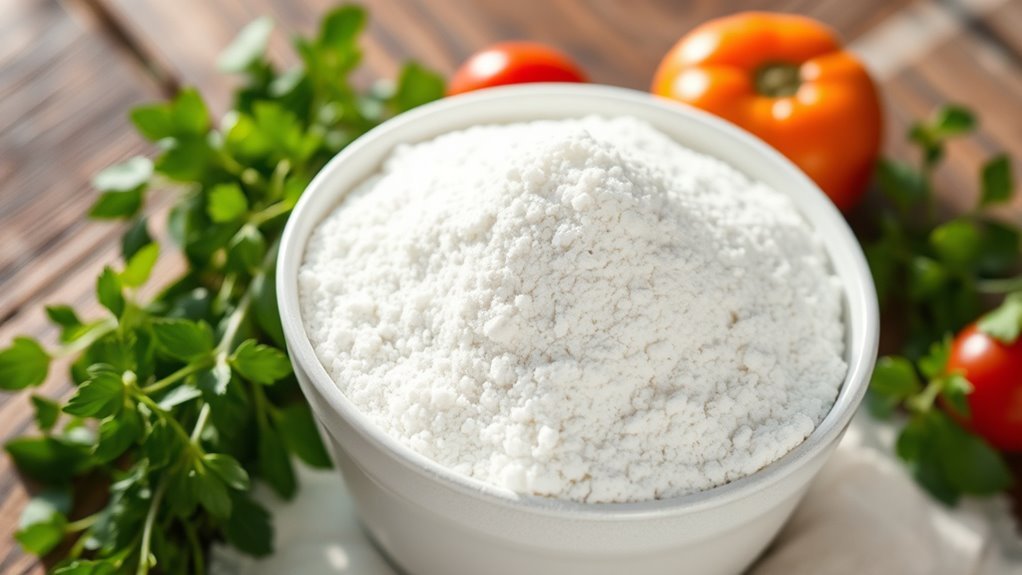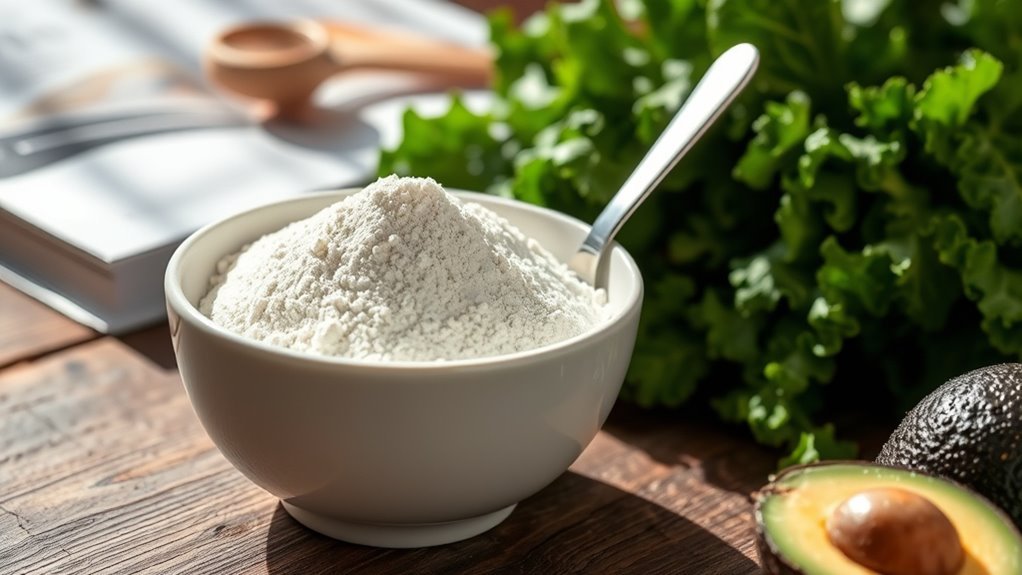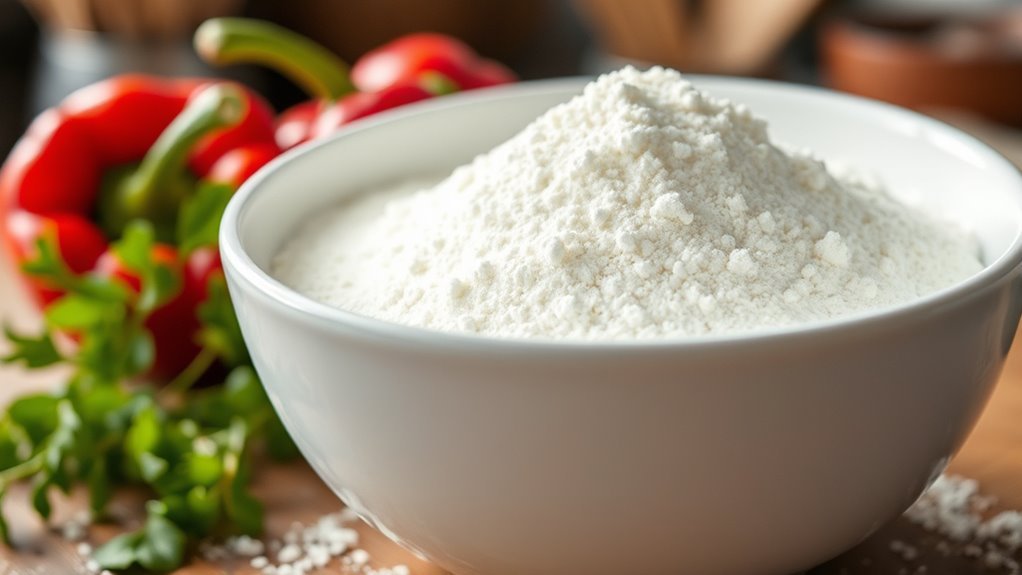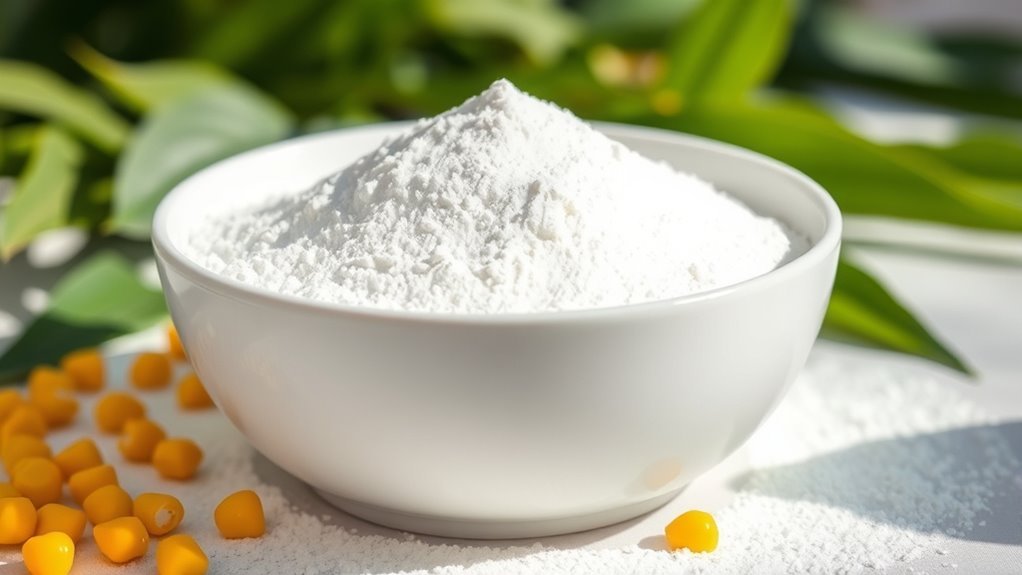Corn starch isn’t suitable for a ketogenic diet due to its high carbohydrate content, which can disrupt ketosis. With around 30 grams of carbs per ¼ cup, it can shift your body back to burning glucose for energy, hindering your weight loss goals. Its high glycemic index may also cause blood sugar spikes. To maintain ketosis, it’s essential to choose low-carb alternatives that align with your nutritional goals. There are effective substitutes that can meet your needs.
Understanding the Ketogenic Diet

While you might be familiar with various diet trends, the ketogenic diet stands out due to its unique approach to macronutrient consumption. At its core, the ketogenic principles emphasize a high-fat, moderate-protein, and very low-carbohydrate intake. This shift encourages your body to enter a state of fat adaptation, where it becomes more efficient at burning fat for energy instead of carbohydrates. By drastically reducing carbs, your insulin levels drop, promoting fat breakdown and ketone production. Research indicates that this metabolic state not only supports weight loss but may also enhance mental clarity and energy levels. Understanding these aspects can empower your dietary choices, allowing you to embrace a lifestyle that prioritizes nutritional freedom while harnessing the benefits of ketosis.
What Is Corn Starch?

Corn starch, a fine, white powder derived from the endosperm of corn kernels, is commonly used as a thickening agent in cooking and baking. Its versatility makes it a staple in many kitchens, where you can find it in sauces, soups, and desserts. One of the primary corn starch uses is its ability to create a smooth texture, enhancing the overall quality of dishes. Additionally, corn starch benefits include its gluten-free nature, making it an excellent alternative for those with gluten intolerance. Beyond the kitchen, it’s also utilized in the food industry for stabilizing and preserving products. Understanding these aspects can empower you to make informed choices about your cooking and dietary preferences.
Nutritional Profile of Corn Starch

When evaluating the nutritional profile of corn starch, it is vital to note that it primarily consists of carbohydrates, making up about 90% of its composition. This high carbohydrate content translates to a significant caloric density, often around 350 calories per 100 grams. However, corn starch lacks dietary fiber, which is essential for digestive health and can help regulate blood sugar levels. Without fiber, it’s important to reflect on how corn starch might fit into your overall dietary goals, especially if you’re mindful of carbohydrate intake. In a diet focused on freedom and balance, understanding these nutritional aspects of corn starch can guide you in making informed choices that align with your health objectives.
Carbohydrate Content and Ketosis
When considering corn starch on a keto diet, it’s important to look at its carbohydrate count, which is quite high. A standard serving can contain upwards of 30 grams of carbs, potentially impacting your ketosis levels. Understanding how these carbs fit into your daily allowance will help you make informed dietary choices.
Carbohydrate Count in Corn Starch
Although it’s often used as a thickening agent in various recipes, corn starch is primarily composed of carbohydrates, which can greatly impact your ketogenic diet. With about 30 grams of carbs per ¼ cup, it’s crucial to reflect on how corn starch fits into your carb counting strategy. If you’re following strict dietary guidelines for ketosis, you’ll need to be cautious about incorporating corn starch into your meals. Each serving can quickly consume a significant portion of your daily carb limit, potentially hindering your ability to stay in ketosis. If you’re aiming for a low-carb lifestyle, be mindful of the hidden carbs in common ingredients like corn starch, and explore alternatives that align better with your dietary goals.
Impact on Ketosis Levels
The impact of corn starch on ketosis levels is significant due to its high carbohydrate content, which can easily disrupt your state of ketosis. A single serving of corn starch contains around 30 grams of carbs, far exceeding the daily limit for most ketogenic diets. When you consume it, your body will likely shift back to burning glucose for energy instead of fat, hindering your progress. To maintain ketosis, consider corn starch alternatives like almond flour, coconut flour, or psyllium husk, which provide lower carb options without sacrificing texture in your recipes. By choosing these alternatives, you can enjoy your meals while keeping your ketosis levels intact, giving you the freedom to indulge without derailing your keto journey.
Corn Starch and Blood Sugar Levels
When you consume corn starch, its glycemic index can greatly affect your blood sugar levels. This means it can lead to a rapid increase in glucose, prompting an insulin response that may not align with a ketogenic diet. Understanding these factors is essential for managing your carbohydrate intake and maintaining stable blood sugar levels.
Glycemic Index Impact
While many people on a keto diet focus on minimizing carbohydrate intake, understanding the glycemic index (GI) of foods like corn starch is essential for managing blood sugar levels. Corn starch has a high glycemic load, meaning it can cause significant spikes in blood sugar. For those seeking to maintain stable glucose levels, it’s vital to evaluate corn starch alternatives, such as almond flour or coconut flour, which have lower glycemic indices. By replacing corn starch with these options, you can enjoy meals without compromising your keto goals. Monitoring the glycemic impact of your food choices empowers you to make informed decisions, helping you maintain energy and overall health while enjoying the freedom of a ketogenic lifestyle.
Insulin Response Factors
Understanding how corn starch affects insulin response is essential for anyone monitoring their blood sugar levels on a keto diet. Corn starch can notably impact insulin sensitivity and hormone regulation, leading to fluctuations in blood sugar. Here are key factors to take into account:
- Glycemic index: Corn starch has a higher glycemic index, which can spike blood sugar.
- Portion control: Consuming large amounts may overwhelm your body’s insulin response.
- Combination with fats/proteins: Pairing with these can slow glucose absorption.
- Individual metabolism: Everyone’s body reacts differently based on genetics and lifestyle.
- Frequency of consumption: Regular intake may reduce insulin sensitivity over time.
Alternatives to Corn Starch in Keto Cooking
As you explore keto cooking, finding suitable alternatives to corn starch can enhance your dishes without jeopardizing your dietary goals. Consider using keto thickeners like xanthan gum, which thickens without adding carbs. Low carb flours, such as almond flour and coconut flour, can also be used for baking and cooking, giving your meals texture. For a nutritious twist, try chia seeds or flaxseed meal, which can absorb liquid and create a thick consistency. Psyllium husk is another excellent option for binding and thickening in recipes. If you prefer a starch-based alternative, arrowroot powder can be a good choice, though use it sparingly. Finally, gelatin alternatives can add thickness while remaining keto-friendly. Enjoy experimenting with these versatile ingredients!
When Might Corn Starch Be Used on a Keto Diet?
Although corn starch is generally avoided on a keto diet due to its high carbohydrate content, there are specific situations where it might be considered. If you find yourself in a pinch, using corn starch could be an option for certain keto recipes under careful circumstances. Here are some scenarios:
- Thickening Agent: For a small amount in sauces or gravies.
- Baking: When you need a binding agent in a low-carb treat.
- Texture Improvement: Enhancing the mouthfeel of specific dishes.
- Emergency Substitute: If other corn starch substitutes aren’t available.
- Occasional Indulgence: As a rare treat without derailing your overall carb intake.
Always assess how it fits into your daily macros before making a decision.
Potential Health Implications of Corn Starch
Using corn starch in limited circumstances might seem convenient, but it’s important to contemplate the potential health implications associated with its consumption. While it’s a common thickening agent, corn starch can present health risks, particularly for those following a ketogenic diet. Its high carbohydrate content can lead to spikes in blood sugar, potentially disrupting metabolic effects essential for ketosis. Regular consumption may contribute to weight gain and insulin resistance, counteracting the benefits of a low-carb lifestyle. Additionally, some individuals may experience digestive issues, as corn starch is often processed and lacks fiber. Being aware of these factors can help you make informed choices and maintain your health while pursuing dietary freedom.
Personalizing Your Keto Diet: Making Choices
When personalizing your keto diet, it’s essential to explore low-carb alternatives that fit your nutritional goals. You’ll want to be mindful of ingredients that can hinder your progress, particularly those high in carbohydrates. Understanding these factors can help you make more informed choices to support your keto journey.
Low-Carb Alternatives Available
As you navigate your keto journey, it’s essential to explore low-carb alternatives that can effectively replace high-carb staples like corn starch. These substitutes not only support your dietary goals but also enhance your culinary versatility. Here are some great options to take into account:
- Almond flour: A popular keto-friendly flour that’s low in carbs and high in healthy fats.
- Coconut flour: Another keto-friendly flour, perfect for baking with a subtle flavor.
- Psyllium husk: Great for adding fiber and improving texture in recipes.
- Xanthan gum: A thickening agent that mimics the properties of corn starch effectively.
- Low carb sweeteners: Use alternatives like erythritol or stevia to satisfy your sweet tooth without the carbs.
With these options, you can maintain your keto lifestyle with ease and creativity.
Ingredients to Avoid
While exploring low-carb alternatives can enhance your keto cooking, it’s equally important to be mindful of certain ingredients that can derail your progress. One key ingredient to avoid is corn starch, as it’s high in carbohydrates and can spike your blood sugar levels. Instead, consider keto substitutes like almond flour or coconut flour, which offer lower carb counts and retain baking qualities. Additionally, steer clear of high-sugar sauces and processed foods that often contain hidden sugars. Always check labels for ingredients that can disrupt ketosis, such as maltodextrin and artificial sweeteners that affect insulin levels. By making informed choices about the ingredients to avoid, you’ll maintain your keto lifestyle and enjoy the freedom of effective, satisfying meals.
Final Thoughts on Corn Starch and Keto
Although corn starch is a versatile ingredient in many recipes, it doesn’t align well with the principles of a ketogenic diet. If you’re committed to keto meal prep, it’s essential to evaluate alternatives that won’t spike your carb intake. Here are some corn starch alternatives you might explore:
- Xanthan Gum: Thickens and stabilizes without carbs.
- Guar Gum: Offers similar properties with minimal calories.
- Psyllium Husk: Adds fiber while thickening.
- Coconut Flour: Low in carbs and provides a unique flavor.
- Almond Flour: Delivers a nutty taste and texture.
Frequently Asked Questions about Corn Starch and the Keto Diet
1. Is corn starch considered keto-friendly?
Corn starch is generally not considered keto-friendly due to its high carbohydrate content. A standard serving of corn starch contains about 30 grams of carbohydrates, which can significantly exceed the daily carbohydrate limit for those adhering to a ketogenic diet. Therefore, it’s advisable to avoid corn starch if you are following a strict keto regimen.
2. What are the alternatives to corn starch on a keto diet?
For those on a keto diet, there are several alternatives to corn starch that are lower in carbohydrates. Options include xanthan gum, coconut flour, and almond flour, which can be used as thickening agents or for baking. These alternatives not only provide similar textures but also align better with the macronutrient requirements of a ketogenic lifestyle.
3. Can corn starch kick me out of ketosis?
Yes, consuming corn starch can potentially kick you out of ketosis. Since ketosis relies on maintaining a very low intake of carbohydrates, the high carb content of corn starch can lead to elevated blood sugar levels, which may disrupt the state of ketosis. If you are aiming for ketosis, it’s best to avoid corn starch altogether.
4. How does corn starch affect blood sugar levels?
Corn starch is a refined carbohydrate that can cause a rapid increase in blood sugar levels. When consumed, it is quickly digested and absorbed, leading to spikes in glucose levels. For individuals on a keto diet or those managing blood sugar, this can be problematic as it can lead to insulin resistance and cravings for more carbohydrates.
5. Are there any health benefits to using corn starch?
While corn starch is often used as a thickening agent in cooking, it does not offer significant health benefits, especially for those on a keto diet. It is low in nutrients and high in calories, which makes it less favorable compared to whole food options. However, it can provide a quick source of energy in non-keto contexts. For those on a ketogenic diet, focusing on nutrient-dense foods is typically more beneficial.
References
- https://en.wikipedia.org/wiki/Cornstarch
- https://www.healthline.com/nutrition/keto-diet-foods#what-to-eat
- https://www.ncbi.nlm.nih.gov/pmc/articles/PMC6466635/
- https://www.mayoclinic.org/healthy-lifestyle/nutrition-and-healthy-eating/expert-answers/keto-diet/faq-20419077
- https://www.ncbi.nlm.nih.gov/books/NBK499877/
- https://www.sciencedirect.com/science/article/pii/S2351978917300074
- https://www.webmd.com/diet/what-is-the-keto-diet
- https://www.medicalnewstoday.com/articles/323045


